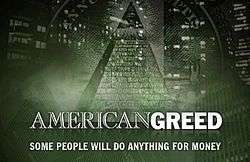American Greed
American Greed, also known as American Greed: Scams, Scoundrels, And Suckers and as American Greed: Scams, Schemes, And Broken Dreams, is an original primetime series airing on the business news network CNBC.[1][2] It was created by Mark Hoffman president, CEO, and chairman of the board at CNBC. The program is narrated by Stacy Keach Jr..[3] It first aired on June 21, 2007, in the US and is currently airing in its thirteenth season.[4] Episodes are also rebroadcast on the Court TV Mystery television network.
| American Greed | |
|---|---|
 | |
| Genre | Documentary |
| Narrated by | Stacy Keach |
| Country of origin | United States |
| Original language(s) | English |
| No. of seasons | 13 |
| No. of episodes | 176 & 3 Specials (list of episodes) |
| Production | |
| Executive producer(s) | Sharon Barrett Charles Schaffer |
| Producer(s) | Kurtis Productions |
| Production location(s) | Chicago, Illinois |
| Release | |
| Original network | CNBC |
| Original release | June 21, 2007 – Present |
| External links | |
| Website | |
Subjects
The business-reality program focuses on the stories behind high-profile corporate and white collar crimes betrayals and scams in American history, including the financial scandals involving WorldCom,[5] HealthSouth,[6] Tyco International,[7] and CyberNET.[8] In addition, stories feature low-profile financial crimes affecting individual investors and smaller companies, including various Ponzi schemes, real estate and other investment frauds, bank robbery, identity theft, medical fraud, embezzlement, insurance fraud, murder-for-hire, art theft, credit card fraud, money laundering, and crimes committed by elected officials.[1]
In addition, there have been 3 American Greed special presentations: American Greed Special: Bernie Madoff Behind Bars;[9] American Greed: Special Presentation: 9/11 Fraud - “A Contractor Capitalizes on Disaster";[10] and Mob Money: an American Greed Special Presentation.[11]
Episodes
The show began airing its thirteenth season in January, 2019.
Companion series
In August 2012 CNBC aired the series American Greed: The Fugitives which focused on active cases of alleged white-collar crime. The show documented stories of suspects who were still at large and had continued to evade authorities.[12] It lasted 2 seasons, covering 13 cases of financial crimes.[13] After the Nov. 14, 2013, airing of American Greed: The Fugitives #12, viewer tips led to the successful Nov. 26, 2013, arrest of FBI Most Wanted fugitive David Kaup, who had been a fugitive since Dec. 17, 2012, when he failed to appear for sentencing in Los Angeles.[14][15]
In early 2019, CNBC aired another companion series, American Greed: Deadly Rich, which focused on high-profile murder cases involving the wealthy.
On July 15, 2020, it was announced that another companion series titled American Greed: Biggest Cons will premiere on July 20, 2020.[16]
Criticisms
The show has been criticized for the portrayal of law enforcement's interest and involvement in combating fraud, citing that many frauds were discovered only after a number of people had already been victimized; e.g., the largest fraud, Bernie Madoff's $65 billion Ponzi scheme, ended only after he confessed. In civil fraud claims, courts require that the fraud be pleaded with specificity and the proponent provide documentation corroborating the claim.[17] In the Madoff case, an early administrative complaint was dismissed for lack of evidence, with the claim of a Ponzi scheme deemed speculative and unsubstantiated using essentially the same standard federal courts employ in evaluating civil fraud claims.[18]
References
- Goldman, Beth (June 11, 2007). "CNBC's "American Greed: Scams, Scoundrels and Scandals" To Premiere on Thursday, June 21st". CNBC.
- "American Greed". CNBC. February 3, 2012.
- http://www.robertfeder.com/2015/02/18/bill-kurtis-for-us-greed-has-been-good/
- https://www.moviefone.com/tv/american-greed/178448/season-11/%5B%5D
- Keach, Stacy. "American Greed: Inside the WorldCom Scam | DHS: Department of Hollywood Scams". www.cnbc.com.
- Keach, Stacy. "American Greed: A Wall Street Wonder Takes a Fall". www.cnbc.com.
- Keach, Stacy. "American Greed: Party's Over: Tyco's Kozlowski". www.cnbc.com.
- Keach, Stacy. "American Greed: Fraud in Cyberspace". www.cnbc.com.
- Keach, Stacy. "American Greed Special: Bernie Madoff Behind Bars". www.cnbc.com.
- "American Greed: Special Presentation: 9/11 Fraud - "A Contractor Capitalizes on Disaster"". www.cnbc.com.
- "Mob Money: An American Greed Special Presentation" – via www.imdb.com.
- "The Power of 'Greed'". HuffPost. August 13, 2012.
- "American Greed: The Fugitives: Seasons". www.cnbc.com.
- CNBC, Celia Watson Seupel, Special to (December 4, 2013). "A capture after 'American Greed: The Fugitives' profile". CNBC.
- "Fugitive Who Failed to Appear for Sentencing for Carrying Out a Multi-Million-Dollar Scheme That Defrauded Homeowners Arrested in Las Vegas". FBI.
- "CNBC's "American Greed: Biggest Cons" Premieres Monday July 20th at 10PM ET/PT". The Futon Critic. July 15, 2020.
- Fed. R. Civ. Pro 9 content
- content
- Matulich, Serge; Currie, David (June 2008). "Richard Scrushy: The Rise and fall of the King of Health Care". Handbook of Frauds, Scams, and Swindles: Failures of Ethics in Leadership (Illustrated ed.). CRC Press. pp. 315–351. ISBN 978-1-4200-7285-3. OCLC 214285931. Retrieved 2009-05-19.
- Jennings, Marianne (August 2006). "Innovation Like No Other". The Seven Signs of Ethical Collapse (annotated ed.). New York: St. Martin's Press. pp. 214–216. ISBN 0-312-35430-4. OCLC 63297926.
- Markham, Jerry (December 2005). "Full Disclosure Fails". A Financial History of Modern U.S. Corporate Scandals: From Enron to Reform (illustrated ed.). Armonk, N.Y: M.E. Sharpe. pp. 360–364. ISBN 0-7656-1583-5. OCLC 58536658.
1. Fed.R. Civ. Pro 9.
2. Ashcroft v. Iqbal, 556 U.S. 662 (2009).